WHEELS OF INDUSTRY.
Page 4
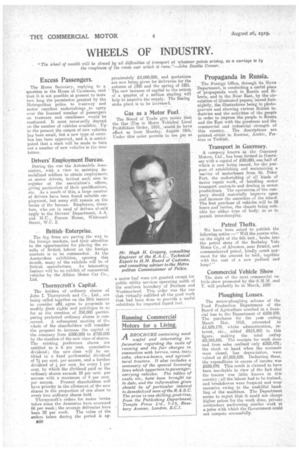
Page 5
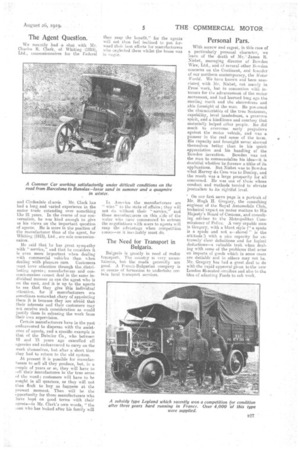
Page 6
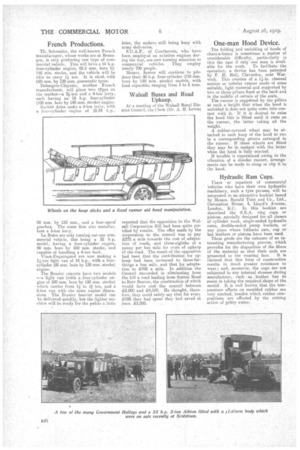
Page 7
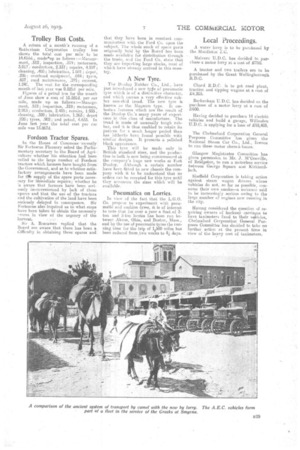
Page 8
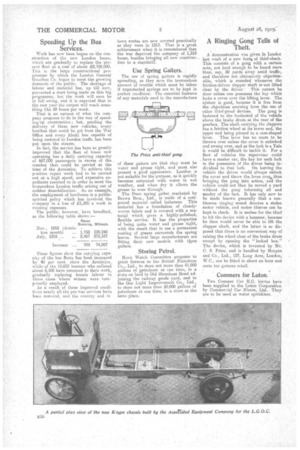
If you've noticed an error in this article please click here to report it so we can fix it.
"The wheel of wealth will be slowed by all difficulties of transport at whatever points arising, as a carriage is by the roughness of the roads over which it runs."—John Beattie Crosser,
Excess Passengers.
The Home Secretary, replying to a question in the House of Co...nmons, said that it is not possible at present to state how long the permission granted by the Metropolitan police to bamway and motor omnibus undertakings ,to carry over the licensed number of passengers on tramcars and omnibuses would be continued. It must necessarily depend on the number of vehicles available: Up to the present the output of new vehicles has been small, but a new type of omnibus has been approved, and it is anticipated that a start will be made to turn out a number of new vehicles in the near future.
['Myers' Employment Bureau.
During the war the Automobile Association, with a view to assisting demobilized soldiers to obtain employment as motor drivers, invited such men to register at the association's Offices, giving particulars of their qualifications, etc. As a result of this, a large number of drivers have been found suitable employment, but many .still remain on the books of the bureau. Employers, therefore, who are in need of drivers should apply to the Drivers' Department, A A. and MX., Fanum House, Whitcomb Street, W.C. 2.
British Enterprise.
The big firms are paving the way to the foreign markets, and their attention to the opportiuuties for placing the results of British labour on the foreign markets is to be commended. At the Amsterdam exhibition, opening this month, many of the exhibits will be of British manufacture. An interesting feature will be an exhibit of commercial vehicles by the Albion Motor Car Co., Ltd.
• Thornycroft's Capital.
The holders of ordinary shares of John I. Thornycroft and Co., Ltd., are being called together on the 28th instant to consider andagree to proposals to modify „their rights and privileges in so far as the . creation of. 250,000 participating preferred ordinary shares is con cerned. A subsequent meeting of the whole of the shareholders will consider the proposal to increase the capital of the company from £500,000 to £750,000 by the creation of the new class of shares. The existing preference shares are entitled to6 per cent, cumulative dividend; the new class will be entitled to a fixed prefeeential dividend of 71per cent, per annum, and a furtherdividend of per cent. for every 1 per cent, by which the dividend paid or. the ordinary shares exceeds 10 per cent per annum with a maximum of 9 per cent. per annum. Present shareholders will have priority in the allotment of the new shares in the proportion of one share to every two ordinary shares held,
Thornyeroft's orders for motor lorries taken since the Armistice have averaged 66 per week; the average deliveries have been 22 per week. The value of the orders taken during the period is ap11213
proximately £2,000,000, and quotations are now being given for deliveries for the autumn of 1920 and the spring of 1921. The new increase of capital to the extent of a quarter, of a million sterling will help to improve the supply. The Basing stoke plant is to be increased.
Gas as a Motor Fuel. .
The Board of Trade give notice that the Gas (Use in Motor Vehicles) Local Prohibition Order, 1918,. :'eased to have effect as from Monday, August' 18th.' Under this order permits to use gas as a motor fuel were not granted except for public utility services operating north of the southern boundary of Durham and Westmorland. This order was the one that virtually nullified all the good work that had been done to. provide a useful substitute for imported liquid fuel.
Propaganda in Russia.
The Foreign Office, through its News Department, is conducting a useful piece of propaganda work in Russia and Siberia, and in the Near East, by the circulation of illustrated papers; issued fortnightly, the illustrations being in photogravure and showing various British industries and the activities of the people in order to impress the people in Russia and the East with the greatness and the commercial and -industrial strength of this country. The descriptions are printed-either in Russian, Arabic, Persian or Turkish.
Transport in Guernsey.
A company known as the Guernsey Motors, Ltd., has been formed in Guernsey with a capital of £20,000, one half of which is now being issued, for the purpose of establishing and maintaining a service of motorbuses from St. Peter Port, the undertaking of all kinds of motor repair work, of handling motor transport contracts and dealing in motor, productions. The operation s of. the company should materially improve upon and increase the amenities of the island. The first purchase of vehicles will be 20 buses and lorries, the chassis being suitable for either type of body, so as to permit interchanging,.
Petrol Thefts.
We have been asked to publish the following notice :—" Will the person who, on the night of the 6th inst., broke into .the petrol store of the Berkeley Vale Motor Co., of Alveston, near Bristol, and commandeered petrol, kindly remit payment for the amount he tonic., together with the cost of a new padlock and hasp?"
Commercial Vehicle Show
The date of the next commercial vehicle show promoted by the S.M.M. and T. will probably be in March, 1920
Ploughing Losses.
The motor-ploughing scheme of the Food Production Department of the, Board of Agriculture resulted in a financial loss to the Department of £839,970. The purchases -for the year ending March 31st, 1918, amounted to £1,629,179, whilst administration, interest, etc., added £615,902 to this figure, making the total outlay £2,245,081. The receipts for work done and from sales realized only £322,472; the stock on hand when the accounts were closed, less depreciation, were valued at £1,082,639. Deducting these, the expenditure in excess of income was £839,970. This result is claimed to have been inevitable in view of the fact that the tractor was little known in this country; all the labour had to be trained, and breakdowns were frequent and wear excessive owing to the unskilful handling of the machines. The Department seems to regret that it could not charge higher prices for the work done, private contractors performing similar work at a. 'price with which the Government could not compete successfully.
The Agent Question.
We recently had a °hat with Mr. Charles R. Clark, of. Whiting (1915), Ltd., concessionnaires for the Federal and Clydesdale chassis. Mr. Clark has had a long and varied experience in the motor trade extending over something like 21 years. In the course of our conversation, he was kind enough to give us his views on the important question of agents. He is more in the position of the manufacturer than of the agent, for Whiting (1915), Ltd., are sole concessionnaires.
He said that he has great sympathy with service," and that he considers it is 'even more important when dealing with commercial vehieles than when
dealing with pleasure cars. Customers must have • attention through this distri• buting agents; nianufacturees andcon• cessionnaires cannot deal in the same individual manner as can the agent who is on the spot, and it is up to the agents to see that they give this individual attention, for if manufacturers are sometimes somewhat chary a appointing them it is because they are afraid that their interests and their customers may not receive such consideration as would justify them in releasing the work from their own supervision.
Certain manufacturers have in the past endeavoured to dispense with the assist:nice of agents and a specific -example is that of the Daimler Co., who between 10 and 15 years ago cancelled all agencies and endeavoured to carry on the work themselves, but after a short time they had to return to the old system.
At present it is possible for manufacturers to sell all they produce, but, in a couple of years or so, they will have to sell their manufactures in the-true sense. ofthe word ; customers will have to be sought in all quarters, as they will not then fleck to buy: as happens at the present moment. Then will be the opportunity for those manufacturers who have kept on -good. terms with their' agents—in Mr. Clark's own words, " the ;a= who has looked after his family will then reap the benefit," for the agents-will riot then feel inclined to put forward their best efforts for manufacturers who neglected them whilst the boom was in vogue.
Li America the manufacturers are " wise." to the state of _affairs; they will not do without their " service,"" and_
these manufacturers on thisof the wate-e Who have commenced to entrust the negotiations with users to agents will reap the advantage when competition tomes—as it inevitably must The Need for Transport in Bulgaria.
Bulgaria is greatly in need of motor transport. The country is very mountainous, kint the roads, generally are good. A French-Bulgarian company is in course of formation to undertake certssin local transport services.
Personal Pars.
. With sorrow and regret, in this case of a particularly personal character, we learn of the death of Mr. 'James R. Nisbet, managing director of Bowden Wire, Ltd., and of several other Bowden concerns on the Continent, and feuuder of our northern contemporary, the illuter World. We have known and been associated with Mr. Nisbet, not merely in Bresig. work, but in connection with interests for the advancement of the motor movement, and had learned low, ago the sterling merit and the shrewdness and able foresight of the man, He possessed the characteristics of the true beetsmati, capability, level headedness, a generous spirit, and a kindliness and courtesy that materially helped other people. he did much to overcome early prejudices against the motor vehicle, and was a pioneer in the real sense of the term. His capacity and foresight never showed themselves better than in his quick appreciation and his handling of the Bowden invention. Bowden was not the man to commercialize his idea—it is doubtful whether be foresaw a tithe of its applications. But Nisbet was to Bowden what Harvey du Gros was.to'Dunlop, and the result was a large prosperity for all concerned. He was one of those whose conduct and methods tended to elevate journalism to its rightful level.
' On our first news page is a portrait of Mr. _Hugh H. Gregory, the conSultinaengineer of the Royal Automobile Club,„ technical-expert on motor matters to His Majesty's Board of Customs, and consulting adviser to the Metropolitan Commissioner of Police. A very capable man is Gregory, with a blunt style (" a spade is a spade and not a—shovel " is the attitude !) with a nice capacity for extremely' clear definitions and for logical deductions—a valuable trait when dealing with some of the problems that arise on imports cif goods which in somecases are dutiable and in others may not be. Mr. Gregory has had a great deal to do with the rapid approval given to the new London 46-seated omnibus and also to the idea of adapting Fords to cab work.
French Productions.
Th. Schneider, the well-known French manufacturer, whose works are at Besancon, is only producing one type of commercial vehicle. This will have a 14 h.p. four-cylinder engine, 82.5 mm. bore by 140 mm. stroke, and the vehicle will be able to carry 11 ton. It is shod, with 880 mm. by 120.nim.. pneumatic tyres. Delangere:Clayette, another French manufacturer, will place two tS‘pes on the market—a 31-ton and a• 4-ton lorry, each having an 18 h.p. four-cylinder (100 mm. bore by 140 mm. .stroke) engine.
Societe Aries make a 4-ton lorry-, with a four-cylinder engine of 18-24 hp., 90 nom. by 150 mm.. and a four-speed gearbox. The 6:11110 'firm also manufacture a 5-ton lorry.
• La Buire are only turning out one cOmmercial vehicle, this being a 32 h.p. model, having a four-cylinder engine, 90 nun, bore by 160mm. stroke, and capable of handling a 4-ton load. Vinot-Deguingand are now making a 11-ton light van of 14 h.p., with a fourcylinder (80 mm. bore by 130 mm. stroke)
engine. .
The Brasier concern have two models —a light van (with a -four-cylinder engine of 100 mm. bore by 150 mm. stroke) which carries from 1i to 1 ton, and a 5-ton van with the same engine dimensions. The Brasier heavier model can be delivered quickly, but the lighter machine will be ready for the public a'little later, the makers still being busy with army deliveries. '
S.C.A.P., of Courbevoie, who have been employed on aviation engines during the war, are now turning attention to commercial vehicles. They employ nearly 700 people.
Messrs. Sourer will continue to produce their 30 h.p. four-cylinder (110 mm. bore by 140 mm. stroke) models, with load eapacitiee ranging from 3 to 5 tons.
Walsall Buses and Road Upkeep.
At a meeting of the Walsall Rural District Council, the Clerk (Mr. A. H. Lewis)
reported that the opposition to the Walsall Corporation Bill had been quite justified by results. The offer made by the corporation to the council was to pay 2275 a mile towards the cost of adaptation of roads, and three-eighths of a penny per bus mile for costs of upkeep of the road. The result of the opposition had been that the contribution for upkeep had been increased to three-farthings a bus mile, and that for adaptation to 2700 a mile. In addition the Council succeeded in eliminating from the bill a road leading from Sutton Road to Barr Beacon, the construction of which would have costthe council between 23,000 and 24,000. He thought, therefore, they could safely say that for ever) 2100 they had spent they had saved at least 21,000.
One-man Hood Device.
The folding and unfolding of hoods of chars-a-banes is sometimes a matter of considerable difficulty, particularly is this the case if only one man is avail
able for the work. To facilitate the operation, a device has been patented by F. H. Hall, Claver4lon, near Warwick. This consists of a 11-in. channel section or tubular runner made of some suitable, light material and supported by two or three pillars fixed at the back and in the middle of certain of the seats.
The•runner is supperted 'by the pillars at such a height that when the hood is unfolded it does not quite come into contact with it. h it is desired. to raise the hood this is lifted until it rests on the runner, the latter taking all the weight.
A rubber-covered wheel may be attached to each hoop of the hood to run in a corresponding groove arranged in the runner. If these wheels are fitted they may be in contact with the latter when the hood is fully erected.
If trouble is experienced owing to the vibration of a slender runner, arrangements can be made to strap or clip it to the hood.
Hydraulic Ram Cups.
Users or repairers of commercial vehicles who have their own hydraulic machinery, such a tyre presses, will be interested in an attractive booklet issued by Messrs. Ronald Trist and Co., Ltd., Coronation House, 4, Lloyd's Avenue, London, E.C. In this booklet are described the S.E.A. ring cups or pistons, specially designed for all classes of cylinder work, single-ended hydraulic rams, double-ended pump buckets, or any place where hitherto ram, cup or hat leathers or pistons have been used.
These goods are the outcome of an interesting manufacturing process, which provides for the disposition of the fibres of the material so that their ends are presented to the wearing face. It is claimed that this form of construction results in much greater resistance to wear; and, moreover, the cups are not subjected to any internal stresses during
manufacture, inch as leather has to resist in taking the required shape of the
mould. It is well known that the ternperattne effects on moulded rubber are very marked, besides.which rubber compositions are affected by the cutting action of gritty water.
Trolley Bus Costs.
A return of 4 month's running of a Rotherham Corporatien trolley bus shows the total cost per mile to be 14.653d., madeup as follows :—Maieuaernent, .512, inspection, .319; motormen, 3.017 : conductors,. 2.337; repairs, 4.287; cleaning, .405 ; lubricatioa, 1.031 ; depot, .220; overhead equipment, .044; tyres, .857; road maintenance, .375; current,
1.241. The cost for the corresponding month of last year was 9.521d per mite.
Figores of a petrol his for the month of June show a cost of 15.581d. per car mile, made up as follows:—Managernent, .512; inspection, .319; motormen, 2.913; coed-octets, 2.485; repairs, 1.935, cleaning, .399; lubrication, 1.263; depot .220; tyres, .902; and petrol, 4.633. in June last Year the total cost, per car mile was 13.8678.
Fordson Tractor Spares.
In the House of Commons 'recently Sir Fortescue Flannery asked the Parliamentary secretary to the Board of Agriculture whether his attention had been called to the large number of Fordson tractors which farmers have bought from the Government, and as to whether satisfactory arrangements have been made for tlir; supply of the spare parts necessary for immediate repairs; whether he is aware that farmers have been seriously inconvenienced by lack of these epares and that the use of the tractors and the cultivation of the land have been seriously delayed in consequence. Sir Forteseue also inquired as to what steps have been taken td obtain the necessary ,eares in view of the urgency of the harvest.
Sir A. Boscawen replied that the Board are aware that there has been a (lifficulty in obtaining these spares and that they have been in constant communication with the Ford Co. upon the subject. The whole stock of spare parts originally held by the Board has been made available for distribution through the trade, and the Ford Co. state that they are imperting large stocks, most of which have already arrived in this country.
A New Tyre.
The Dunlop Rubber Co., Ltd., have just introduced a new type of pneumatic tyre whieh is of a distinctive character, and which carries a very effective rubber non-skid tread. The new tyre is known as the Magnum type. it cmbodies features which are the result of the Dunlop Co.'s many years of experience in this class of manufacture. The tread is made, of unusually tough rubber, and it is thus enabled to retain its pattern for a much longer period than has hitherto been found possible with similar designs. It presents a polished black appearance.
This tyre willbe made only in British standard sizes, mid the production in bulk is now being eommmeneed at, the company's huge new works at Fort Dunlop. Although a certain number have been fitted to new chassis the company wish it to be understood that no orders can be accepted for this tyre until they annonece the sizes which will be available.
Pneumatics on Lorries.
In view of the fact that the L.G.O. Co. propo-m to experiment with pneumatic and cushion tyres, it is of interest to note that for over a year a fleet of 3ton and 5-ton lorries has been run between Akron, Ohio, and Boston, Mass., and by the use of pneumatic tyres1he running time for the trip of 1.,500 miles has been reduced from two weeks to 41days.
Local Proceedings.
A water lorry is to be purchased by the, Middleten Malvern U.D.C. has decided to purchase a motor lorry at a "Lust of £750.
A tractor and two trailers are to be purchased by the Great Wellingborough. R.D.C.
Chard R.D.C. is to get road plant, traction and tipping wagons at a cost of £4,203.
Beckenham U.D.C. has decided on the purchase of a motor lorry at a cost of Having decided to purchase 14 electric vehicles and build al garage, Willesden U.D.C. is applying for a loan of £18,489.
The Chelmsford Corporation General. Purposes Cemmittee has given the National Stearn Car Co., Ltd., licence to run three motor chars-a-banes.
Glasgow Magistrates Committee has given permission to Mr. J. M'Conville., of Bridgeton, to run a motorbus service between George Square and Kirkiutilloch.
Sheffield Corporation is taking action against steam wagon drivers whose vehicles do not, so far as possible, consume their own smokea-a nuisance said to be increasingly serious owing to the large number of engines new running in the city.
Havtng considered the question of requiring owners of hackney carriages to have taximeters fixed to their. vehicles, Chelmsford Corporation General Purposes Committee. has decided to take no further action at the present time in view of the heavy cost of taximeters.
Speeding Up the Bus Services.
Work has now been begun on the construction of the new London buses, which are gradually to replace the present fleet at a cost of about £2,750,000. This is the large constructional programme by which the London General Omnibus Co. hopes to meet the growing demands of the public. The shortage of labour and material has, up till now, prevented a start being made on this hieprogramme, but the work will soon be in full swing, and it is expected that in the new year the output will reach something like 50 buses per week.
That is an earnest of what the company proposes to do in the way of speeding-up construction; but, pending the delivery of these new vehicles, every krribus that could be got from the War Office and every khaki bus capable of being restored to London traffic has been put upon the streets. In fact, the service has been so greatly improved that the fleet of buses now operating has a daily carrying capacity of 667,000 passengers in excess of the number that could be carried at the time of the Armistice. To achieve this position repair work had to be carried out at a, high speed, and expensive expedients resorted to in order to meet" the tremendous London traffic arising out of sudden demobilization. As an example, the employment of lorribuses is a publicspirited policy which has involved the company in a loss of 21,500 a week in running expenses.
The public, however, have benefited, as the following table shows :— Buses
Running. mileage. Nov., 1918 (Armis
tice month) ... 1,758 1:99,240 July, 1919 ... ... 2,467 273,337 Increase ... 709 74,097 These figures show the carrying capacity of the bus fleets has heed increased by. 40 per cent. since the Armistice, hile•of the 10;033 busmen who enlisted about 6,100 have returned to their work, gradually replacing female labour in those cases 'where women . were temporarilyemployed.
As a result of these improved conditions nearly all the pre-War services have haps restored, and tl.e country and in town routes are now covered practically as they were in 1913. That is a great achievement when it is remembered that the war deprived the company of 1,319 buses, besides bringing all new construetion to a standstill.
Use Spring Gaiters.
The use of spring gaiters is rapidly spreading, as they save the tremendous amount of trouble which must be taken if unprotected springs are to be kept in perfect condition. The essential features of any materials used in the manufacture
of these gaiters are that they must be water and grease tight, and must also present a good appearance. Leather is not suitable for the purpose, as it quickly becomes saturated with water in wet weather, and when dry it allows the grease to ooze through. The Duco spring gaiter marketed by Brown Bros., Ltd., is made of a compound material called letherene. This material has a foundation of closelywoven fabric and is covered with a material which gives a highly-polished, flexible service. It has the properties of 'being quite water and grease tight, with the result that in use a permanent coating of grease surrounds the spring leaves. Several large manufacturers are fitting their new models with these gaiters.
Storing Petrol.
Hove Watch Committee proposes to grant licences to the British Petroleum Co., Ltd., to store not more than 41,000 gallons of Detrokum at one time, in a store on land in Old Shoreham Road adjoining the railway goods yard, and to the Gas Light Improvement Co., Ltd., to store not more than 20,000 gallons of petroleum at one time, in a store at the same place.
A Ringing Gong Tells of Theft.
A demonstration was given in Londos last week of a new form of thief-check. This consists of a gong with a certain note, not loud enough to be heard more than, say, 50 yards away amid traffic, and therefore not obtrusively objectionable, which is sounded whenever the friction-driven clapper shaft is-not lifted clear by the driver. • This cannot be done unless one possesses the key which locks a cover over the lifting lever. The 4stem is good, because it is free from the objections accruing from the use of other thief-proof devices. The gong is fastened to the footboard of the vehicle above the brake drum at the rear of the gearbox. The shaft carrying the clappers has a friction wheel at its lower end, the upper end being pinned to a cam-shaped lever. This lever has no room to be thrown over unless the cover is unlocked and swung over, and as the lock is a Yale it would be difficult to tackle it. For a fleet of vehicles the superviser could . have a master car, the key for each lock in the possession of the driver being individual to that lock. On leaving the vehicle the driver would always unlock the cover and throw the lever over, thus bringing the gong into action, and the vehicle could not then be moved a yard without the gong informing all and sundry of the fact.It has only now to be made known generally that a continuous ringing -sound denotes a stolen motor vehicle, and motor thieves can be kept in check. It is useless for the thief to hit the device with a hammer, because he then would never be able to lift the clapper shaft, and the latter is so disposed that there is no convenient way of raising the wheel clear of the brake drum except by opening the "locked box." The device, which is invented by Mr. C. S. Price, and is handled by Morgan and Co., Ltd., 127, Long Acre, London, W.C., can be fitted in about an hour and costs ten guineas retail.
Commers for Luton.
Two Commer Car R.C. lorries have been supplied to the Luton Corporation by Commercial Car Hirers, Ltd. They are to he used as water sprinklers.
























